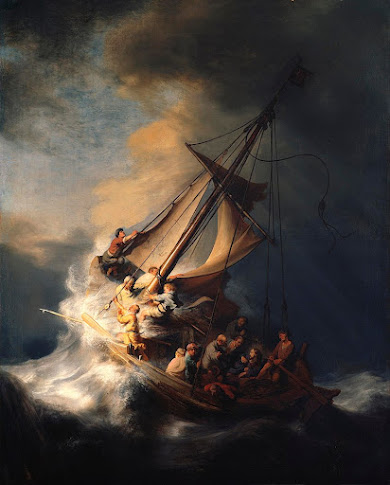When the sabbath came he began to teach in the synagogue,
and many who heard him were astonished.
In other places where people weren't familiar with Jesus they were astonished in a positive sense because of the authority with which he taught and the way his words had power even over unclean spirits. But in Nazareth where they thought they knew him the astonishment was of a different sort. They had watched Jesus grow up and knew his family. They thought that this new ministry came so out of the blue that there was no explanation for it except that it was fabricated for effect. Jesus had left their town and become popular in the surrounding regions. But to the people of Nazareth he was just one of them, no better than them, and this seemed to lead to jealousy. The more he began to stand out from among them the less they were interested to hear what he had to say.
They said, “Where did this man get all this?
What kind of wisdom has been given him?
What mighty deeds are wrought by his hands!
They heard the wisdom of Jesus spoken to them. And they were at least aware of the reports of mighty deeds wrought by his hands. But rather than hoping that those mighty deeds be performed among them they closed their hearts to both his teaching and his power. They weren't ready for Jesus to be anyone other than the person they had all known from before "the carpenter, the son of Mary". Rather than returning to Nazareth to become a hometown hero Jesus was like someone who left a small town to be educated and then achieve success in a big city who returned home only to find he had alienated those who knew him previously. But with Jesus this reaction was intensified. Because what they rejected was not merely education and success over and against poverty and common sense wisdom. They rejected the wisdom and the power of God over and against the status quo.
Jesus said to them,
“A prophet is not without honor except in his native place
and among his own kin and in his own house.”
In his life on earth Jesus' native place was in Nazareth. But now it within his Church. And so the risk is that we become overly familiar with our own conceptions of who Jesus was in the past to the extent that we no longer even entertain the possibility of who he wants to be now. In the lives of strangers to the faith who experience his presence for the first time we see Jesus honored, and the full possibilities of faith in him unleashed. But in our own lives we tend to become so accustomed to him that he is not able to perform many mighty deeds. Our faith, it seems, is often not much better than that of the people of Nazareth. Let it not be said that Jesus was amazed at our lack of faith. Let us remain open as he brings his wisdom to bear on our lives and to remain hopeful for the mighty deeds he still desires to perform in our midst.
"Tour all the tribes in Israel from Dan to Beer-sheba
and register the people, that I may know their number."
It's possible that we've fallen into the habbit of relying on the total resources at our disposal rather than on God and his providence. It's not bad to do a census unless the purpose of that census is to ensure that we don't need to depend on God, or so that we can show off to our neighbors. Either motivation will have us engaged on such worldly terms that we won't have room for faith. So if this has described us let us repent as David repented so that the Lord is again free to reign in us.











_-_WGA24868.jpg)


.jpg)
